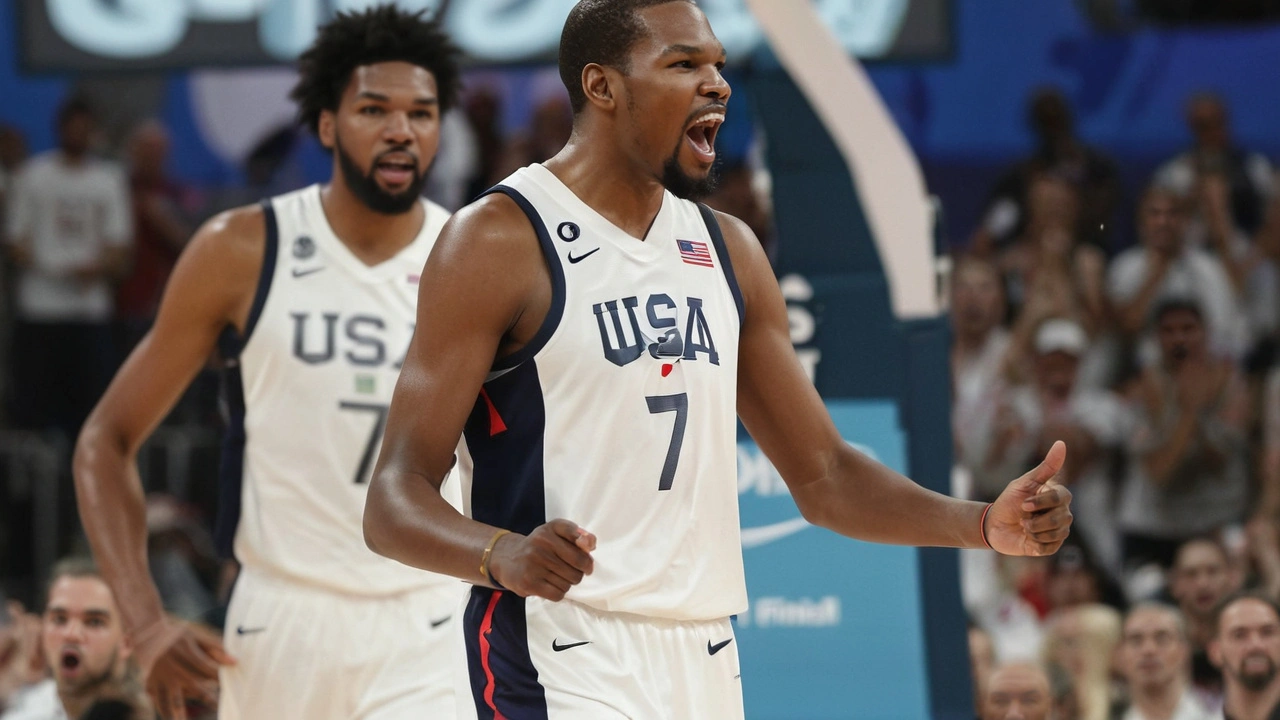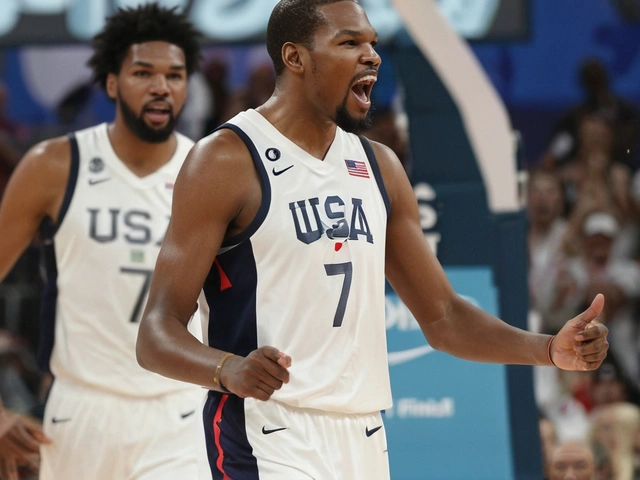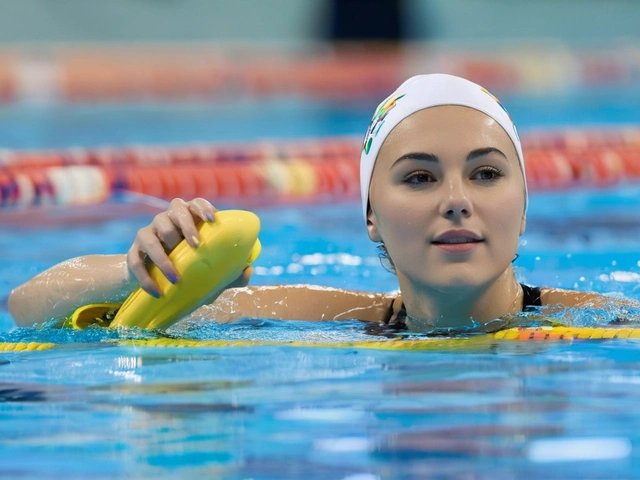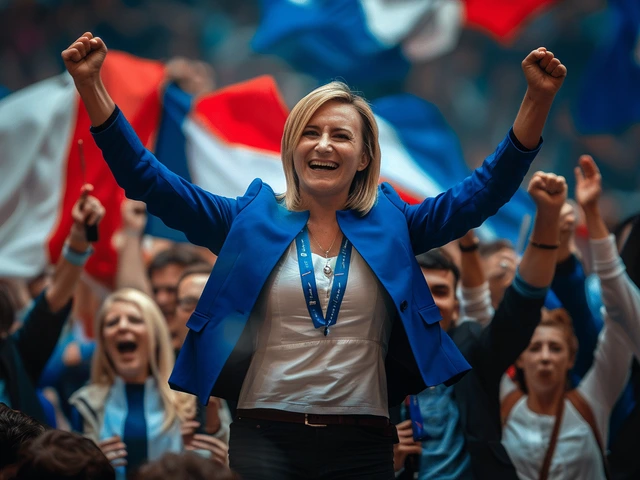The Paris 2024 Olympics is poised to feature an electrifying climax in the men’s basketball category, as the United States team is set to go head-to-head with host nation France in the gold medal showdown. This epic clash of titans is not just a battle for Olympic supremacy but a confrontation of national pride, basketball prowess, and a test of grit and determination.
The Path to the Final
The U.S. basketball team, historically a powerhouse, has once again showcased their dominance throughout the tournament. Loaded with basketball legends and rising stars, the team has been a formidable force on the court. With household names such as LeBron James, Kevin Durant, and the fresher yet extraordinary talent of Stephen Curry, the American squad has lived up to their top billing. Their journey to the finals is encapsulated in knockout performances, none more thrilling than their semifinal face-off against Serbia. Trailing by 11 points at halftime, many would have counted them out, but the resilience and experience of their roster came through in a late-game surge that saw them snag a heart-pounding 95-91 victory. Curry’s 36-point masterpiece, punctuated by a crucial late-game three-pointer, was nothing short of spectacular.
France, on the other hand, has their own compelling narrative. Bursting with hometown fervor, the French team aims to turn the tables after a heartbreaking loss to the U.S. in Tokyo. Leading the charge is the dynamic Victor Wembanyama, whose towering presence and versatile play have been a revelation this season. France's hard-fought path to the final was sealed with a spectacularly tight 73-69 win against Germany, where Guerschon Yabusele’s 17-point contribution proved decisive. This will mark France’s second consecutive Olympic final, showcasing their growth and rising stature in international basketball.
The Star-Studded Rosters
Team USA
The American team brings a blend of seasoned veterans and talented newcomers, combining calculated experience with fresh energy. LeBron James, with a wealth of experience and leadership, pairs perfectly with Kevin Durant's sharpshooting and defensive prowess. But it’s the addition of Stephen Curry that has added a spark to this Olympiad. Curry’s shooting skills from beyond the arc are legendary, and his presence on the court imposes a constant threat to any defense. The roster also includes versatile players like Jason Tatum and Zach LaVine, who can switch from offensive dynamism to staunch defense at a moment’s notice.
Team France
Victor Wembanyama, who stands an imposing 7 feet 4 inches tall, leads the French charge. This young phenom is the future of French basketball, combining agility, shooting finesse, and defensive solidity. The team's strength also lies in its depth, featuring key contributors like Rudy Gobert, a defensive stalwart; and Evan Fournier, who provides scoring threats both as a shooter and playmaker. The synergy between these players manifests as a cohesive unit capable of surprising any opponent. France also thrives on the tactical acumen of coach Vincent Collet, whose strategies have continually pushed the team beyond their perceived limits.
The Stakes of the Final
The gold medal game is not merely a contest of skills but carries immense symbolic weight. For Team USA, it’s about affirming their place as the undisputed global superpower in basketball. They aim to dispel any budding narrative suggesting that the rest of the world is closing in on them. Each player understands the legacy they are adding to and the profound sense of national pride they represent.
France, nourished by the pain of defeat in Tokyo, is playing not just for redemption, but for the joy of triumph on home soil. Victory here would not only elevate French basketball to new heights but also capture the imagination and admiration of fans across the nation. For the players, it's a once-in-a-lifetime opportunity to etch their names in the annals of French sports history.
Anticipating the Final
The anticipation around this final is immense. With the Paris Games already introducing new events like breakdancing, this basketball final adds to the glitter and garners attention beyond just the sports community. The arena will be electrified with local support roaring for France, while the global basketball audience will be closely tuning in, eager to witness whether the USA can maintain their dynasty or if France can stage a monumental upset.
This stakes-loaded finale promises not just a showcase of stellar individual performances but also a compelling narrative woven through teamwork, strategy, and heart. As the clock ticks down to the much-awaited tip-off, one thing is certain: this duel will be a memorable chapter in Olympic basketball history, no matter who takes home the gold.
As we gear up for Saturday night’s spectacle, fans worldwide are set to witness a battle that underscores the spirit of the Olympics—a convergence of exceptional talent, national pride, and the relentless pursuit of glory. Before the main event, Serbia and Germany will contend for bronze, showcasing the depth of talent and competitiveness that has marked this tournament.





Comments
Statistically, the United States has secured 15 gold medals in men's Olympic basketball since 1936, a dominance that makes any final feel almost predetermined. Their current roster blends veteran leadership with perimeter shooting, which historically translates to a high offensive rating in the knockout stages. France, while impressive as a host, has only one gold from 1948, and their recent runs have largely hinged on defensive schemes rather than scoring firepower. The matchup therefore underscores a classic offense‑versus‑defense narrative, with the U.S. likely to exploit transitional opportunities. Expect the final to be decided before the fourth quarter if the Americans maintain their pace.
That’s a solid breakdown, but it’s worth noting that France’s young big man can stretch the floor, forcing the U.S. to adjust their interior defense. The French team has shown a remarkable ability to close out games under pressure, as evidenced by their narrow win over Germany. Their coach’s emphasis on ball movement could disrupt the typical American isolation plays, creating mismatches that favor perimeter shooters. Moreover, the home‑court advantage can’t be dismissed; the crowd energy often translates into elevated performance for the host nation. So while the odds favor the Americans, the final could still be a tightly contested affair that comes down to minutes.
All that talk about “home‑court advantage” forgets that no team has ever beaten the USA in a gold‑medal match, not even on foreign soil 🙂. Indian basketball fans know that talent is universal, but the U.S. system simply produces more elite players. If France wants a chance, they need to overhaul their training pipeline, not rely on a single star. The reality is clear: the American squad will dominate, and any dissenting optimism is just noise.
The French will have the crowd behind them.
Whoa, hold up, you’re missing the bigger picture here, the U.S. team is stacked with multiple MVPs, seasoned veterans, and deadly shooters, so even with the crowd screaming, the odds are still heavily tilted toward America, you can’t just count on the noise, you need execution, talent, and depth, all of which the Americans possess in spades!
Imagine the arena lights blazing, the echo of thousands of fans chanting, the ball soaring through the air like a comet, and then-sudden silence as a buzzer sounds, sealing a destiny that will be written in the annals of Olympic lore!!!
The final showdown between France and the United States encapsulates more than just a contest of skill; it reflects the evolving geopolitics of basketball, where the sport has transcended its American roots to become a global language of competition. Historically, the United States has leveraged a robust collegiate system that feeds talent into professional leagues, creating a pipeline that is difficult for other nations to emulate. France, however, has invested heavily in youth academies, and the emergence of players like Victor Wembanyama signals a shift towards European homegrown dominance. This dichotomy raises the question of whether raw athleticism can outweigh disciplined, tactical play cultivated over years of structured training. The U.S. roster, featuring veterans such as LeBron James and Kevin Durant, brings experience that often translates into clutch performances under pressure. Conversely, the French squad benefits from the collective synergy fostered by playing together in domestic leagues, which can enhance on‑court chemistry. In the semifinals, the United States overcame a 11‑point halftime deficit through strategic adjustments and superior depth, underscoring the importance of adaptability. France’s path, marked by a narrow victory over Germany, demonstrates resilience and a capacity to execute in high‑stakes moments. The presence of a 7‑foot‑4 phenom in Wembanyama adds a unique visual and strategic element that can disrupt conventional offensive schemes. At the same time, the United States’ perimeter shooting, epitomized by Stephen Curry’s 36‑point performance, remains a potent weapon that can change the game's momentum in an instant. Defensive matchups will be pivotal; Rudy Gobert’s shot‑blocking prowess could neutralize inside scoring, while the U.S. defensive specialists will aim to limit France’s transition opportunities. Coaching philosophies will also play a decisive role, with Vincent Collet’s tactical acumen potentially countered by the American staff’s emphasis on pace and space. The psychological factor of playing on home soil cannot be dismissed, as the French crowd’s energy may elevate the players beyond their usual performance levels. Yet the pressure of expectation can also become a burden, leading to uncharacteristic errors in critical phases. Ultimately, the outcome may hinge on which team can better manage the ebb and flow of the game, maintain composure, and capitalize on fleeting opportunities. Regardless of the victor, the match promises to be a defining moment in Olympic basketball history, inspiring future generations worldwide.
Your analysis captures the multifaceted nature of this encounter beautifully; it reminds us that preparation, adaptability, and mental fortitude are the true hallmarks of champions. May both teams bring their best and deliver a spectacular contest for the sport’s enthusiasts worldwide.
France’s tactical discipline could very well offset the United States’ sheer firepower in the paint.
i think its defnitely a clash of styles – the french play a smooth, almost lyrical game while the usa bring raw explosivity – both are a delite to watch, dont you agree?
The whole hype around this final is overrated; it’s just another predictable win for the American juggernaut, and anyone pretending otherwise is selling a fantasy.
From a systems theory perspective, the outcome aligns with the existing performance equilibrium, validating the predictive models.
Well, this matchup seems okay… 🤷♀️
Let’s hope it’s an exciting game! 😃
When we consider the broader cultural implications of the Paris 2024 basketball final, we find that sport serves as a conduit for national identity, diplomatic expression, and collective memory, intertwining the narratives of two nations that have long shared both rivalry and mutual respect on the hardwood. The United States, with its deep‑rooted basketball heritage, has exported a style that emphasizes individual brilliance, fast‑break transitions, and a storied tradition of Olympic triumphs that have become emblematic of American athletic ambition. France, on the other hand, brings a nuanced approach that reflects its European basketball philosophy-prioritizing ball movement, defensive coordination, and a reverence for the tactical intricacies that have evolved within its domestic leagues. This convergence of distinct basketball cultures on the global stage provides an opportunity for cross‑pollination of ideas, where French fans may adopt elements of American flair, while American players can glean insights from the disciplined, team‑first mindset that the French exemplify. Moreover, the very setting of Paris, a city steeped in artistic and historical significance, adds layers of symbolism to the contest, transforming it from a mere sporting event into a celebration of shared human achievement. The spectators, both in the arena and worldwide, will witness a narrative that transcends scores and statistics, resonating with themes of perseverance, unity, and the relentless pursuit of excellence that define the Olympic spirit. Whether the final concludes with an American victory or a French triumph, the legacy will endure in the stories told by future generations, inspiring aspiring athletes across continents to dream beyond borders. It is this enduring impact that underscores why we, as global citizens, should cherish such moments of international competition, for they remind us that while we may compete, we also connect through the universal language of sport.